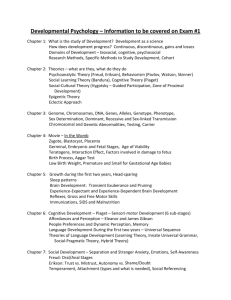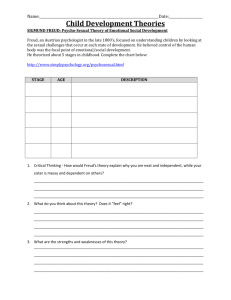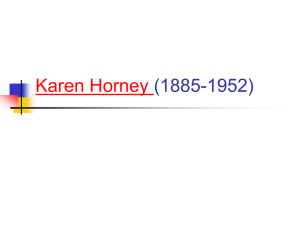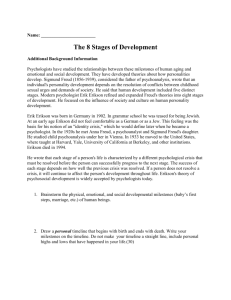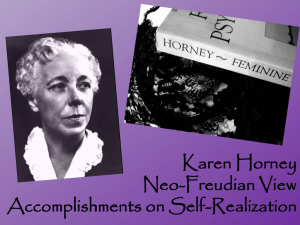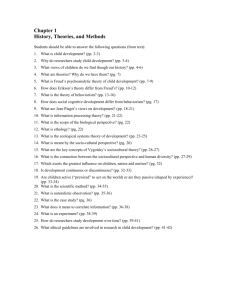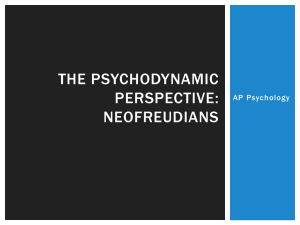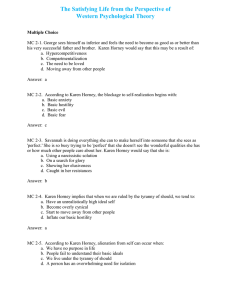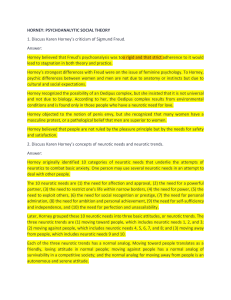Sigmund Freud, Karen Horney, Erik Erikson. Social Living in a
advertisement
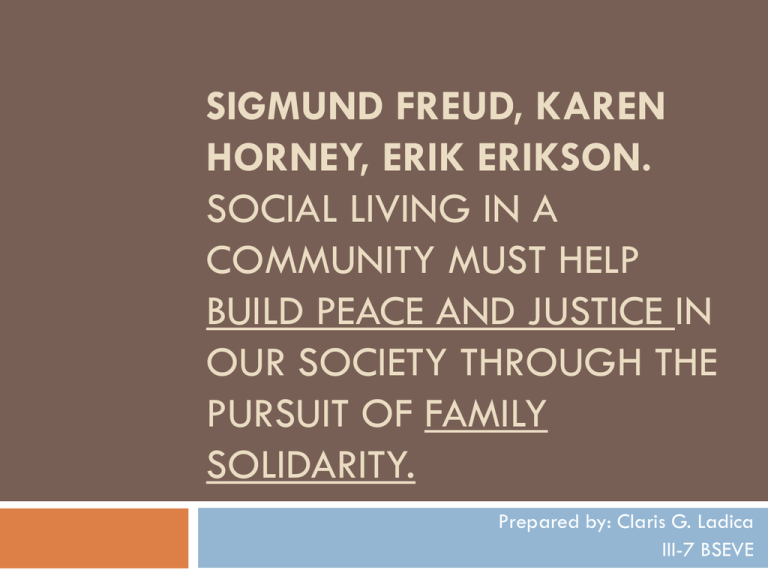
SIGMUND FREUD, KAREN HORNEY, ERIK ERIKSON. SOCIAL LIVING IN A COMMUNITY MUST HELP BUILD PEACE AND JUSTICE IN OUR SOCIETY THROUGH THE PURSUIT OF FAMILY SOLIDARITY. Prepared by: Claris G. Ladica III-7 BSEVE Sigmund Freud’s Short Biography born as Sigismund Schlomo Freud on May 6, 1856 in Maravia Austrian Fields: - Neurology - Psychoanalysis - Psychotherapy died in London on September 23, 1939 Psychosexual Stages of Development Oral Stage (first year of life) An infant’s eating, sucking, spitting, and chewing do not only satisfy hunger, but also provide pleasure. • Issues with dependency or aggression. • problems with drinking, eating, smoking, or nail biting. Anal Stage (second to third year of life) During this stage, children must endure the demands of toilet training. • individual has a messy, wasteful, or destructive personality. • individual is stringent, orderly, rigid, and obsessive. Phallic Stage (fourth to fifth year of life) Children at this stage gratify their sex instinct by fondling their genitals and developing an incestuous desire for the opposite sex parent. According to Freud, a fouryear-old boy develops an intense sexual longing for his mother. Oedipus & Electra Complex If he could not have his way, he would destroy his rival for his maternal affection – his father. Freud contends that before age 4, a girl prefers her mother to her father. Latency Stage (sixth year of life to puberty) • libido is channeled into socially acceptable outlets such as schoolwork or vigorous play that consume most of the child’s physical and psychic energy. Genital Stage (from puberty onwards) • individual develops a strong sexual interest in the opposite sex. This stage begins during puberty but last throughout the rest of a person's life. Erik Erikson’s Short Biography Erik Homberger Erikson was born on June 15, 1902 in Frankfurt, Germany to his Jewish mother Karla Abrahamsen and to his biological father, who was an unnamed Danish man. He died May 12, 1994 Psychosocial Stages of Development Trust vs. Mistrust (birth to 1 year) Basic to concept of development is the element of trust. Whether children come to trust or mistrust themselves and other people depends on their early experiences. Autonomy vs. Shame and Doubt (2 to 3 years) As children begin to crawl, walk, climb, and explore, a new conflict confronts them: whether or not to assert their wills. Initiative vs. Guilt (4 to 5 years) During this stage, the repertoire of motor and mental abilities that are open to children greatly expands. Industry vs. Inferiority During the elementary school years, a child becomes concerned with how things work and how they are made. As children move into the world of school, they gain a sense of industry by winning recognition for their achievements. Identity vs. Role Confusion they confront a “physiological revolution”. In the process adolescents must develop an integrated and coherent sense of self. Intimacy vs. Isolation it is the capacity to reach out and make contact with other people – to fuse one’s identity with that of others. . Central to intimacy is the ability to share with and care about another person without fear of losing oneself in the process Generativity vs. Stagnation By generativity, Erikson means reaching out beyond one’s own immediate concerns to embrace the welfare of society and of future generations. Integrity vs. Despair As individuals approach the end of life, they tend to take stock of the years that have gone before. Some feel a sense of satisfaction with their accomplishments. Karen Horney’s Biography She was born in Blankenese, Germany, on September 16, 1885. She attended medical school and began studying psychoanalysis. She died in New York City on December 4, 1952. Basic Anxiety Karen Horney's psychoanalytic social theory assumes that social and cultural conditions, especially during childhood, have a powerful effect on later personality. Neurotic Needs Children deal with their hostility by repressing it. Horney suggested that the repression may be fueled by three different strategies: “I have to repress my hostility because I need you”. (aggressive type) “I have to repress my hostility because I am afraid of you”. (withdrawal type) “I have to repress my hostility for fear of losing love”. (compliance type) Core Related Values Respect and Love for One’s Family As of Karen Horney’s theory, that when a child grows with a loving guidance from his/her parents or family, he/she will learn to cope with threats imposed by nature and society. Family Solidarity If the family is characterized with solidarity, this means that love and affection to each member of the family is present. This kind of environment in the family is very important to a growing child because this will lead to a healthy personality which in turn become manifested as the child becomes a parent and have a family someday. Responsible Parenthood Through these theories, parents or future parents has given an idea about nurturing their children. These theories give them awareness on how they should take care f their children. They are now aware of what kind of nurturing or disciplining that they should’ve done in their children. THANK YOU FOR LISTENING! ^_^
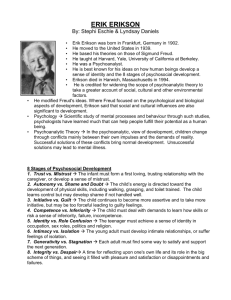
![[W]e should stop bothering about what is femininity are artificial standards….](http://s2.studylib.net/store/data/017925294_1-d7e3172e034664a55ceb291cff98a5d0-300x300.png)
